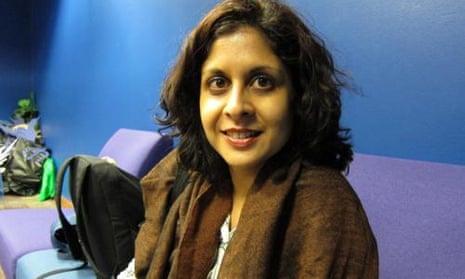From Kurdish writer Choman Hardi’s poetry telling the stories of the survivors of genocide to Trinidadian Vahni Capildeo’s examination of the alienation of the expatriate, the shortlist for the Forward prize for best poetry collection marks a “complete resurgence” and a “breaking down of barriers” in poetry, according to the chair of judges for the prestigious award.
The shortlist for the £15,000 Forward prize for best poetry collection, won in the past by big names including Don Paterson and Sean O’Brien, was announced by writer Malika Booker. She said that this year’s contenders were writers “who are challenging poetry, who are using the formal constraints but are really modern, really expanding what we know as poetry and what we know as the English language”.
The best-known writer on the Forward shortlist is British poet and TS Eliot prize winner Alice Oswald, picked for Falling Awake, a meditation on mutability in nature. Her fellow Brits Ian Duhig and Denise Riley are shortlisted, respectively, for The Blind Road-Maker, which draws from the life of the 18th-century civil engineer Blind Jack Metcalf, and Say Something Back, a reflection on maternal grief.
Hardi, who was born in Kurdistan and sought asylum in the UK in 1993, was picked for Considering the Women, a collection Booker called “poetry as reportage”. The book draws from her postdoctoral research into female survivors of genocide in Kurdistan-Iraq, with its central sequence telling the stories of survivors of the Anfal campaign in the 1980s. “You do not die! Not when you want to,” she writes in her poem Dibs Camp, the Women’s Prison. “Not when your son withers in your lap / and he cries until he can no more, when the last thing / he asks of you is ‘cucumber’, and you give him / a green slipper to suckle on, because he is beyond // knowing the difference.”
Capildeo, who has lived in the UK since 1991, writes in her shortlisted collection Measures of Expatriation about the experience in a mix of poetry and prose: “My having had a patria, a fatherland, to leave, did not occur to me until I was forced to invent one.” Booker said: “It’s definitely pushing boundaries. It’s poetry, it’s prose - it’s very dynamic.”
Booker, a writer and spoken word artist, said British poetry was currently in a very exciting period. “So many poets are now expanding the English language, bringing so much of their own experience into it. A lot of the poems we read were around language and place. On our shortlists you’ve got Greenlandic, Caribbean creole, Scots, Kurdish, in terms of the languages and the landscapes that people are pulling from. They’re also a showcase in the English language, and how it stretches and pulls in from other languages. The poetry we saw has really reflected that this year.”
William Sieghart, founder of the Forward prizes, agreed. “It’s thrilling that the shortlists for all three prizes are so current: the languages and experiences that so many of these poets draw upon expand our vocabulary, enrich us. What we think of as English is expanding all the time - and these poets are on the frontline of change, making homes for new words and dialects, contributing their acuteness of expression, their powers of noticing, to the endless redrafting of the language,” he said.
Sieghart pointed to Nancy Campbell, whose Disko Bay is set in Greenland, and Orkney’s Harry Giles, both shortlisted for the £5,000 Felix Dennis prize for best first collection, as well as Capildeo and Hardi, saying that “many of the poets shortlisted ... have a strong sense of being from elsewhere: they have had to slip between languages and dialects to get by and that makes their experience resonate now, here in modern Britain, where more than 300 languages are now spoken”.
“Maybe poetry is claiming its place as the genre of the age of migration: when your arms can’t carry anything, you can still carry a poem in your head,” said Sieghart.
Booker also pointed out that the 15-strong shortlists feature 11 women. “In this 25th year of the Forward prizes, I feel we’re seeing a complete resurgence and a breaking down of barriers within and around poetry,” she said. “Just look at the shortlist: there are 11 women and the multiplicity of voices is testimony to the fact that the poetry published here now feels totally global.”
Booker is joined on the Forward judging panel by the poets George Szirtes and Liz Berry, the singer/songwriter Tracey Thorn and Poetry magazine’s editor Don Share. The winners will be announced on 20 September, when the 25th annual Forward Book of Poetry, containing the judges’ choice of the year’s poems, will also be published.
The shortlists in full:
The Forward Prize for Best Collection (£15,000)
Vahni Capildeo – Measures of Expatriation (Carcanet)
Ian Duhig – The Blind Road-Maker (Picador Poetry)
Choman Hardi – Considering the Women (Bloodaxe Books)
Alice Oswald – Falling Awake (Cape Poetry)
Denise Riley – Say Something Back (Picador Poetry)
The Felix Dennis Prize for Best First Collection (£5,000)
Nancy Campbell – Disko Bay (Enitharmon Press)
Ron Carey – DISTANCE (Revival Press)
Harry Giles – Tonguit (Freight Books)
Ruby Robinson – Every Little Sound (Liverpool University Press)
Tiphanie Yanique – Wife (Peepal Tree Press)
The Forward Prize for Best Single Poem (£1,000)
Sasha Dugdale – Joy (PN Review)
David Harsent – from Salt (Poetry London)
Solmaz Sharif – Force Visibility (Granta magazine)
Melissa Lee-Houghton – i am very precious (Prac Crit)
Rachel Hadas – Roosevelt Hospital Blues (Times Literary Supplement)

Comments (…)
Sign in or create your Guardian account to join the discussion